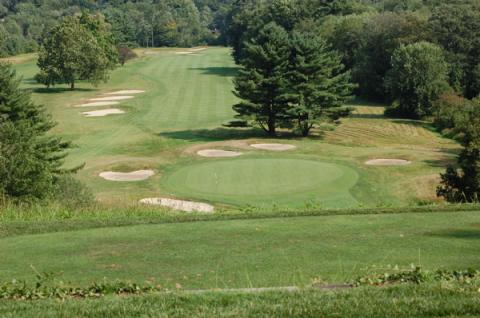For the first time in 23 years, I do not belong to a private golf club. A few months ago, I lapsed my membership at Hop Meadow Country Club in Simsbury, CT, after a year of brain-racking considerations. I loved Hop Meadow's diverse and unpretentious membership; and its rolling golf course suited my game and is one of the most enjoyable in Connecticut, challenging yet not exhausting (except when the superintendent lets the rough grow long).
But in the last couple of years, each round of golf cost me more than $400, on a pro-rated basis.
For my customers contemplating a move south, golf dues and membership are always one of the first topics they raise. My experience is that initiation fees in a golf community with a high-quality, name-designer course average around $40,000. You can find some at $20,000, especially in this economic environment, but you can also find some in excess of $100,000. (The Cliffs' $150,000 membership comes to mind, but it does provide access to seven of the best-conditioned courses you will find in the Carolinas.)
So what compels some of us to plunk down $40,000, or the equivalent of 16 years worth of green fees (one course every week at a fee of $50), and to add to it dues of, say $8,000 a year, or another 160 rounds annually at that same $50. Private club membership, given all the fine daily-fee options, makes absolutely no financial sense, right?
Well, not exactly. Here is my take on why some defy all economic logic and pay the big bucks to drive through gates marked "Members Only."
Fast play -- Yesterday afternoon, in a twosome, I teed off behind a twosome and foursome at a private club in Connecticut. The foursome waved us and the other twosome to play through before the fourth hole, and we finished our round in well under four hours. Rounds of more than 4 ½ hours are now customary on many public courses, especially since they have laid off their rangers to save money.
Name recognition -- Remember the theme song from the TV sitcom Cheers that included the line, "You want to go where everybody knows your name?" Golf pros and their helpers have great memories for names. I was a guest for the first time at the Country Club of Farmington 20 years ago. The legendary pro there, John Murphy, greeted me warmly by name (my host had identified me). I didn't see John for another 18 months, but when I did, he said "Hi Larry." I was impressed. If you play your local muni four days a week, they might begin to give you a personal greeting. On the other hand, they have so much on their plate and so little in the way of job security, that their curt greeting may seem like a kiss off.
Extra amenities -- Daily fee golf clubs offer golf, a snack bar, maybe a dining room, and that's about it. Private country clubs add a pool, tennis courts, a fitness center, junior golf programs -- in short, enough for you to convince the rest of the family that you are spending part of their inheritance for their own good.
Exclusivity -- During busy times at daily fee courses, count on being matched up with a stranger. Some are an absolute joy, and others...well you've met those along the way, I am sure. There is nothing like the serious golfer who dribbles the ball off most tees or, worse, hits everything sideways into the next county, and yet insists on playing every shot into the cup, all 12 of them. Or the one who wants to tell you his life story...at the top of your backswing. Or the one who complains constantly about the golf course and thinks management ripped him off on green fees. Private clubs do a good job generally of matching up compatible players, and club members do a good job of ostracizing the malcontents and idiots. That is certainly worth something.
Friendships -- Private club membership makes it easy to build friendships. The staff is sensitive that a happy, engaged member is one who will keep paying his dues in perpetuity, and they are skilled at introductions. Toddlers need play dates to hone their early social skills; it is never too late for the rest of us to do the same, and a private club is the breeding ground for solid relationships (and the occasional conceded two-foot putt).
To steal shamelessly from a popular TV commercial:
Golf balls: $40.
One-hour lesson on sand play: $110.
Set of new Titleist irons: $1,000.
Fast play, new friends, and a family that thinks you joined the country club for their benefit:
Priceless

It breaks my heart to have to give up my membership at Hop Meadow Country Club in Simsbury, CT, but $400 rounds were too much. I'll miss many things including the view from the par 3 16th tee and out to the par 5 17th fairway beyond.



